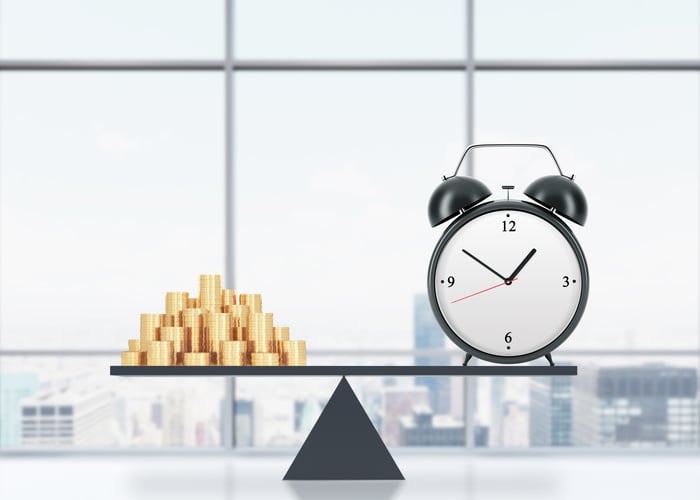On Feb. 9, I published an article providing tips on how to prepare for a crashing market. Within two weeks, the market reached its peak and then quickly started to crash, hard, as efforts to contain the spread of the new coronavirus led to large swaths of the economy shutting down. The timing of that article raises a very good question regarding how I knew the market would crash.
The answer to that question is simple: I knew the market would crash because that's what it does from time to time. There's a constant tug-of-war between fear and greed. When greed is in control, the market goes up, and when fear is in control, the market goes down. Ordinarily, the two are fairly well balanced and the market's moves are orderly and calm. Every once in a while, fear gets a white-knuckle death grip over investors' emotions, and the market crashes.

Image source: Getty Images.
The real question wasn't whether, but when
That the market would crash at some point in time was obvious. When it would happen, on the other hand, was completely beyond my powers of prognostication. I had no idea a major crash was mere weeks away. Had I known when that crash was coming, I would have gone much more heavily into cash and bonds before the market tanked. Had I done so, I would have been far better prepared to buy back in after things settled down. I didn't, and like many investors, I got hit hard when the market swooned.
The distinction between "whether" and "when" matters. Because it's easy to figure out that the market will crash but hard to figure out when it will happen, it becomes important to structure your overall financial plan around a crash being a real possibility. With a strong end-to-end financial plan in place, you and your portfolio can survive a market downturn whenever it happens. In fact, a strong plan may even enable you to use the downturn to buy more stocks while they're available for a discount.
Your top priority: When do you need the money?

Image source: Getty Images.
Key to any successful financial plan is understanding when you'll need to spend the money you have socked away. Generally speaking, there are four broad time periods you'll need to think about:
- At any time, but only in an emergency situation.
- Within the next five years.
- In a longer time period than five years.
- Never, as in money you may never need to spend.
You should think differently about your money for each of those time periods.
Money you have set aside for emergencies -- such as for potential coronavirus-driven unemployment -- needs to be in extremely liquid form, such as cash in a savings account. Your goal there is to have it when you need it, not to earn a giant rate of return on it. In good times, you'll feel like a sucker for having all that cash sitting there earning virtually nothing, but when an emergency strikes, you'll be very glad you have it.
Because that money will earn almost nothing, you'll want to find a balance between how much you have socked away for emergencies and money you are saving for other priorities. As a general rule of thumb, you'll want around three to six months' worth of your expected expenses in your emergency fund, maybe a little more if you're worried about extended unemployment.
Money you'll need in the next five years -- such as to buy a car, pay for your kids' college, or fund the next few years of your retirement -- should be invested in assets with a high likelihood of paying out. A CD ladder, U.S. Treasury bond ladder, or potentially an investment-grade bond ladder make decent potential places for that money.
Like your emergency fund, you're making a conscious decision to trade off the potential of high returns for a strong likelihood that the money will be there when you need it. Unlike your emergency fund, however, the laddered nature of the investments with a longer time frame on some of them means you have the potential to get some return on that investment.
Money you'll need farther in the future -- such as to fund the longer-term portion of your retirement -- may be investable in stocks, which bring with them higher volatility but better potential returns. With this money, you're making the opposite side of the trade-off mentioned above. You're accepting the risk that the money you invest could be worth less in the near term, but you're doing so with the expectation that over the long term, you'll be more likely to make a good return on that investment.
Between its close on Feb. 19 and its close on March 23, the S&P 500 lost nearly 34% of its value, wiping out years of returns in little more than a month, thanks to the coronavirus shutdown. Before that March 23 date, the last time the S&P 500 closed below that level was Dec. 6, 2016, more than three years ago.
Despite that real risk of volatility, over the long run, the S&P 500 has delivered returns that have compounded near 10% on an annualized bases. That makes stocks an attractive potential long-term investment for their ability to help you build wealth over time, despite the very real short-term risks associated with owning them.
If you're not comfortable picking individual stocks, particularly in the time of worldwide quarantines where much of the economy is shutting down, index funds provide a great approach to own stocks. With an S&P 500 index fund, you'll get whatever return the overall index receives -- a rate that tends to beat the vast majority of professional money managers -- without having to pick the winners.
Money you may never need -- such as if your stocks grew in the good times to be more than you think you'll need to cover your future costs of living -- can be invested in alternatives to stocks, bonds, or cash. If you want to try your hand at commodity speculation, complex options strategies, or some other sort of very high-risk/high-potential reward investing, this is the pot of money you can use to try it. Just be sure you don't over-commit yourself and wind up losing money you really need in the next crash.
Alternatively, once you've reached the point where your needs are covered, you can take the approach that once you've won the game, you can quit playing it. If you take that more conservative approach, you won't make as much during a bull market, but you'll probably be sitting pretty comfortably the next time the market crashes. That will give you the chance to channel your inner Warren Buffett and pick up shares of companies at bargain prices the next time the market's panic puts them on sale.
Put your plan in place before the next market crash
If the market's recent decline has taught us anything, it's that it's much better to have your plan in place before the market crashes than it is to wait until after the crash to try and make adjustments. By thinking about your money in terms of when you'll need it and investing accordingly, you can build a plan that helps you prepare for and successfully navigate through the next crash. After all, it's not a question of whether the market will crash again, only of when it will happen.




